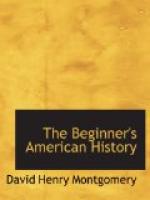[Footnote 4: Alfred Vail: he was the son of Stephen Vail (commonly known as Judge Vail), owner of the Speedwell iron-works, near Morristown, New Jersey. Judge Vail built the engines of the Savannah, the first steamship which crossed the Atlantic.]
[Footnote 5: Model: a small copy or representation of something. Professor Morse made a small telegraph and sent it to Washington, to show what his large telegraph would be like.]
[Footnote 6: Patent: a written or printed right given by the government at Washington to an inventor to make something; as, for instance, a telegraph or a sewing-machine. The patent forbids any one except the inventor, or holder of the patent, from making such a machine, and so he gets whatever money comes from his work. In order to get a patent, a man must send a model of his invention to be placed in the Patent Office at Washington.]
225. Professor Morse asks Congress to help him build a telegraph line; what Congress thought.—Professor Morse now asked Congress to let him have thirty thousand dollars to construct a telegraph line from Washington to Baltimore. He felt sure that business men would be glad to send messages by telegraph, and to pay him for his work. But many members of Congress laughed at it, and said they might as well give Professor Morse the money to build “a railroad to the moon.”
Week after week went by, and the last day that Congress would sit was reached, but still no money had been granted. Then came the last night of the last day (March 3d, 1843). Professor Morse stayed in the Senate Chamber[7] of Congress until after ten o’clock; then, tired and disappointed he went back to his hotel, thinking that he must give up trying to build his telegraph line.
[Footnote 7: Senate Chamber: Congress (or the body of persons chosen to make the laws of the United States) is divided into two classes,—Representatives and Senators; they meet in different rooms or chambers in the Capitol at Washington.]
226. Miss Annie Ellsworth brings good news.—The next morning Miss Annie G. Ellsworth met him as he was coming down to breakfast. She was the daughter of his friend who had charge of the Patent Office in Washington. She came forward with a smile, grasped his hand, and said that she had good news for him, that Congress had decided to let him have the money. Surely you must be mistaken, said the professor, for I waited last night until nearly midnight, and came away because nothing had been done. But, said the young lady, my father stayed until it was quite midnight, and a few minutes before the clock struck twelve Congress voted[8] the money; it was the very last thing that was done.
Professor Morse was then a gray-haired man over fifty. He had worked hard for years and got nothing for his labor. This was his first great success. He doesn’t say whether he laughed or cried—perhaps he felt a little like doing both.




